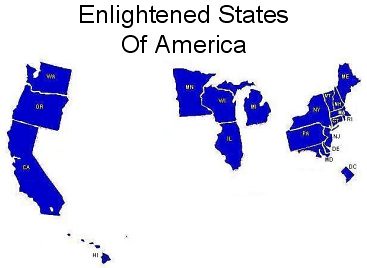When Blue States Become More Important
-- Tenth Amendment of the United States Constitution
With the confirmation hearings on John Roberts Jr. scheduled to start next month and the inevitable battle over a replacement for Justice William Rehnquist sure to follow, the distinction between so-called Blue and Red states takes on a more important and tangible meaning.
When people refer to a judicial nominee as being a "strict constructionist" they are using shorthand for a philosophy that the constitution was intended to be interpreted very literally and provide a limited federal framework for governing. For conservatives, this often leads to the belief that the most compelling social and political issues should be determined at the state level.
Since the 2000 presidential election, we have talked a lot about the sociopolitical Mason-Dixon line that exists in America between Blue states, that tend to vote more Democratic and Red states, that typically lean conservative, if not far Right.
That has led to many humorous essays from the Left that – I think rightfully – depict the Blue states as the ones holding the majority of our country's financial, social, cultural and natural resources. Some have even suggested a Blue state succession, leaving America's Red states much poorer for the split.
As gratifying as that may sound to liberals, I don't think many of us would seriously advocate a permanent political and geographic split of the United States.
And, despite knowing how much of a divided country we have right now, we seldom think of major differences as being strictly segregated by state lines. With a major conservative shift in the Supreme Court looming, that could soon change.

We already have such a demarcation when it comes to gay marriage, with only Massachusetts recognizing the rights of people to marry as they choose. In early 2005, California Superior Court Judge Richard Kramer ruled that the state's same-sex marriage ban violated California's constitution. That ruling, still subject to review by the appellate court, will likely become effective sometime in 2006.
Of course, Roe v. Wade is the elephant in the middle of the room in the future direction of the U.S. Supreme Court and, as much as the Right Wing talks about a liberal litmus test for judicial nominees (based on Roe), they certainly have their own overt and opposing agenda.
Republican Senator Sam Brownback of Kansas is clear when asked if he would like to see Roe v. Wade reversed.
"Yes, I would. And I think you will find that there are a number of legal scholars in this country, from the left and the right, that believe this to be poorly decided, that this was a bad decision. It was poorly decided, not based upon what‘s in the Constitution and it is something that should be overturned."
Brownback further discussed the extent to which performing an abortion may be criminalized by an altered Supreme Court or, at the very least, left to each state to decide.
"They may well do that. But that would be up for the state legislature to decide and the political process, which is where it was prior to 1973. And people were relatively satisfied prior to that period of time. And that's where it should be."
Tony Perkins, James Dobson and others in the Religious Right – who have a firm grip on the ears of George W. Bush and most Republican legislators – make no secret of their fervent desire to see Roe v. Wade overturned. Ultimately, they would like all abortion to be banned but, to a large extent, they would settle, for now, to seeing the legal purview go back to individual states.
So you can bet that with abortion rights about to go center stage and with gay rights already geographically segregated, where we live will unfortunately begin to determine in a much larger way what America we see.
Imagine a United States where the only places affording reproductive rights to women are Massachusetts, New York, California, Illinois and a handful of other states. What does that mean to a woman living in Arkansas or Wyoming?
It means she lives in a different America.
And what will be the next targets of ultra-conservative Republicans and their masters, the Religious Right? Will other forms of medical treatment be deemed morally offensive or otherwise un-Christian? Will each state decide by 2020 whether or not the Second Amendment gives gun nuts the right to walk down the street armed to the teeth, as if we live in old-west Deadwood?
Make no mistake about it: Moderates and liberals are not just watching the Supreme Court this year for yet another reason to distrust the Bush administration. Who is appointed in the next twelve months could have a real and widespread impact for decades.
And the days when living in a Blue state simply meant we made better presidential choices, will be replaced with an America whose Constitution takes on very different meanings and where your rights vary drastically, based on which state you happen to call home.

















<< Home